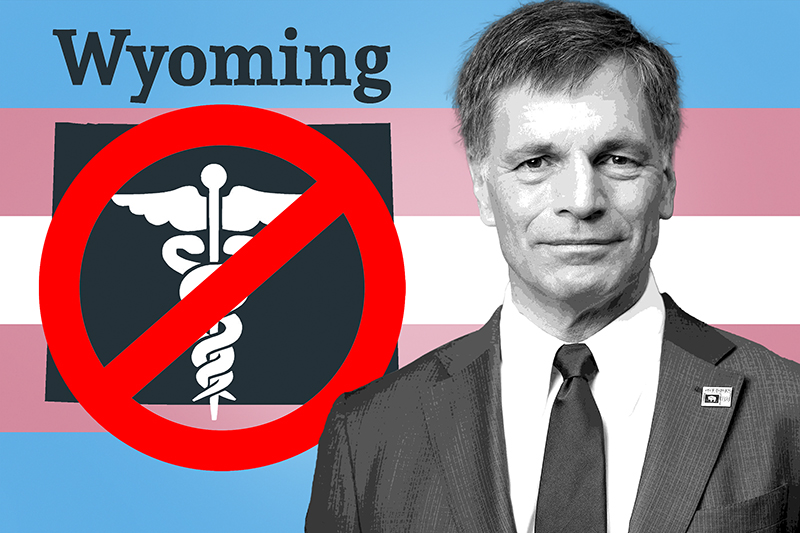The Riley Roundup: Trans Health Care in the News
Transgender people may still encounter hurdles to accessing medically necessary health care -- even if it's not transition-related.

TRANSGENDER SURGERIES TRIPLED PRE-PANDEMIC
A Columbia University study published last month in a medical journal revealed that the number of gender confirmation surgeries in the United States tripled during the three years leading up to 2019, as first reported by the New York Post.
Based on records of in-patient and out-patient procedures obtained from two national surgery databases, around 4,550 Americans sought transition-related surgical procedures in 2016, with that number more than tripling to 13,000 by 2019, according to the study, published in JAMA Network Open.
The study’s authors attribute the rise in surgical procedures to federal and state laws approved during the Obama administration requiring coverage for medically necessary care, including treatments for gender dysphoria. The study only looked at surgical procedures in the years prior to 2020, and not hormonal interventions intended to assist in a gender transition.
In total, about 48,00 individuals underwent surgical procedures from 2016 to 2020, while the overall number of “health system encounters for gender identity disorder” tripled during that same time.
“The rapid rise [in gender dysphoria diagnoses] suggests that there will be a greater need for clinicians knowledgeable in the care of transgender individuals and with the requisite expertise to perform [gender confirmation surgery] procedures,” the report says.
GRANTS FOR ALABAMA TRANS YOUTH
Following an 11th U.S. Circuit Court of Appeals ruling last month, the Campaign for Southern Equality, in partnership with the Birmingham-based Magic City Acceptance Center and Mobile-based Prism United, began informing transgender youth and their families that they could apply for grants from the Southern Trans Youth Emergency Project.
The project is designed to educate Alabama families of trans youth about the now-enforceable law barring minors from accessing gender-affirming care, as well as information about out-of-state providers willing to work with trans youth, and up to $500 to help defray the costs of travel, medication, or other logistics.
Those interested in requesting support from the project are encouraged to visit the Campaign for Southrn Equality’s website at southernequality.org/ALresources.
As nearly two dozen states have passed laws to bar minors from accessing gender-affirming care, two federal appeals courts, the 11th and the 6th Circuits, have ruled in favor of states seeking to curb the practice, with proponents arguing that the treatments involved are “experimental” and that there is not enough research about their long-term effects.
As a result, several lower-court rulings blocking the bans from being enforced have been paused. Currently, only one statewide ban, in Arkansas, has been declared unconstitutional on its merits by a federal district judge.

SPEAKING OF ARKANSAS…
Arkansas Attorney General Tim Griffin has asked that the full 8th U.S. Circuit Court of Appeals, based in St. Louis, Missouri, rehear arguments related to a lawsuit challenging the state’s ban on gender-affirming care for minors.
In his brief, Griffin noted that the 6th and 11th Circuit Courts of Appeal have found that states have a right to regulate potentially risky medical procedures, and argued that a lower court judge had wrongly decided that the ban was unconstitutional by applying the wrong legal standard to the case.
Following that decision, the attorney general’s office appealed the decision to a three-judge panel of the 8th Circuit, which declined to pause a temporary injunction blocking the state from enforcing the law. Griffin subsequently appealed to the full 8th Circuit, which split 6-5 in favor of the transgender youth and their families challenging the ban.
Noting that the vote was so close, Griffin is hoping that the court may reverse its holding and allow the ban to take effect if the case was reheard by the full circuit, reports the Arkansas Times.
The ACLU of Arkansas, which is representing the plaintiff families, has called Griffin’s appeal “predictable and severely misguided.”
“Politicians need to read and heed the judge’s order, be honest with the public about the safety of this life-saving care, and stop bullying young Arkansans and their families,” Holly Dickson, the executive director of the ACLU of Arkansas, said in a statement.
14-YEAR-OLD TRANS GIRL DENIED CARE
A transgender girl and her mother claim that a Catholic medical clinic in Ann Arbor, Michigan, denied the 14-year-old girl treatment for attention deficit hyperactivity disorder after learning she was transgender.
Tiffinny Moutardier and her mom, Jean Oorbeck, claim a doctor at Emmaus Health Partners told them he couldn’t care for Tiffinny due to the clinic’s “religious affiliation.”
Oorbeck claims Dr. Scott Waclawik allegedly told her that they didn’t “feel comfortable” with Tiffinny’s presence in our office, telling her, “We don’t see transgendered (sic) patients in this clinic.”
When she accused him of denying her daughter medical care, he responded that the clinic would be willing to treat her daughter if she had a cold. The clinic denies the allegation, telling Michigan Radio in a statement, “We do not discriminate against patients based on gender identity nor do we refuse to provide care.” However, it declined to comment on the specifics of Moutardier and Oorbeck’s complaint.
While Oorbeck has filed a complaint with the Michigan Department of Civil Rights, and an additional complaint with the Michigan Department of Licensing and Regulatory Affairs. While an updated version of Michigan’s civil rights law prohibits discrimination based on sexual orientation and gender identity, it is unclear whether religious-based medical providers will be allowed to claim exemptions from the law, and, if so, what the type of scope of those exemptions will be.
Already, three religious organizations have filed suits against the law, claiming that protections for transgender people violate their religious freedoms, and arguing that they should be allowed to refuse to perform procedures that do not conform with their religious viewpoints.
Support Metro Weekly’s Journalism
These are challenging times for news organizations. And yet it’s crucial we stay active and provide vital resources and information to both our local readers and the world. So won’t you please take a moment and consider supporting Metro Weekly with a membership? For as little as $5 a month, you can help ensure Metro Weekly magazine and MetroWeekly.com remain free, viable resources as we provide the best, most diverse, culturally-resonant LGBTQ coverage in both the D.C. region and around the world. Memberships come with exclusive perks and discounts, your own personal digital delivery of each week’s magazine (and an archive), access to our Member's Lounge when it launches this fall, and exclusive members-only items like Metro Weekly Membership Mugs and Tote Bags! Check out all our membership levels here and please join us today!



























